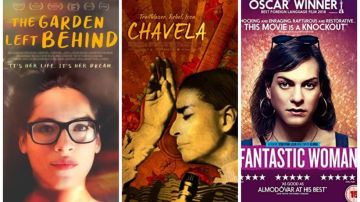8 LGBTQ Latinx Movies to Watch This Pride Month
The LGBTQ community has faced prejudice and violence for many years and although it continues to improve in the United States, places like Latin America still look down upon people in this community

Photos via Wiki Commons and Amazon
Latin American films have represented these issues such as The Garden Left Behind, a story about a Mexican trans women living in New York or Jose which tells a story about a gay man living in Guatemala. Festivals like Outfest Peru and Diverso Festival Internacional de Cine LGBT de Panama have promoted these LGBTQ movies and helped promote acceptance of all sexualities. Here are eight Latinx LGBTQ movies to watch this Pride Month.
wp_*posts
The Garden Left Behind

The Garden Left Behind is about a Tina, played by Carlie Guevara, a Mexican trans woman who moved to New York to live with her grandmother when she was a child. Although the two have a close relationship, Tina begins her transition and her grandmother struggles to deal with it due to her traditional values. Throughout the movie, Tina navigates this experience all while dealing with her immigration status, medical barriers, and juggling multiple jobs.
wp_*posts
Mucho Mucho Amor: The Legend of Walter Mercado

Mucho Mucho Amor: The Legend of Walter Mercado is a documentary that explores the life of iconic Puerto Rican astrologer Walter Mercado. The film starts with Mercado in one of his signature flamboyant and colorful outfits reading astrology signs and discussing his reputation as the “Walter of Miracles” since he was a young boy in PR. It leads you through his life in the public eye and legal battles over ownership of his brand that made headlines. The films signs off with his famous phrase: “Reciban de mi siempre mucho paz, pero sobre todo mucho mucho mucho amor.” wp_*posts
Tu Me Manques

Tu Me Manques is a movie about a conservative father named Jorge, played by Argentine actor Oscar Martinez, who is unable to accept his son’s sexuality and is led on a journey through queer life in New York. It takes a tragic turn when his son, Gabriel, commits suicide so both Jorge and Gabriel’s lover, Sebastian, find a way to honor his memory. Bolivian Director Rodrigo Bellot told Variety, “Homophobia is still pervasive in Latin America where it converges with the machismo and classist tendencies of the region.”
wp_*posts
Queering the Script

Queering the Script is a film about the gay community and representation through media channels. As you watch this documentary, you are introduced to many different people: content creators, actors, and fans of queer media. Queering the Script dives deep into the world of fans who’s lives are heavily influenced by Hollywood. Director Gabrielle Zilkha told CTV News, “Like we said in the doc, that doesn’t mean happy representation, it doesn’t mean picture-perfect characters — it just means more diverse and more complex representation.”
wp_*posts
Mosquita y Mari

Mosquita y Mari is a story that follows two teens in Los Angeles, California who are polar opposites and yet form a strong bond that turns into more than just friendship. Yolanda, played by Fenessa Pineda, is sheltered and preoccupied with fulfilling her parent’s dream of her going to college. Mari, played by Venecia Troncoso, is struggling with the recent death of her father and helping her mom and sister. This coming-of-age story shines a light on discovering your sexuality and the complexities therein. Women and Hollywood asked writer and director Aurora Guerrero what is was like putting her own experiences into the movie: “It was a mixed bag. I mean breaking the silence around who my first love was while I was growing up was very liberating and healing. Coming from such a personal place also really gave the film that tone of realism,” she says.
wp_*posts
José

José is a drama about a young gay man, played by Enrique Salanic, who faces many challenges living in Guatemala due to conservative societal beliefs. He secretly lives out his sexuality though dating-app hookups while working at a restaurant and helping his extremely religious mother at home. Director Li Cheng told Ricepaper, “When I talked to the young people in Latin America, I found many had a hard time – even traumatized, after the loss of love; especially for gay guys, mostly because it is difficult to find a romantic relationship at the first place. I hope when these people watch my film they will feel they are not alone and it will be okay.”
wp_*posts
A Fantastic Woman

A Fantastic Woman is a story about a young trans woman, played by Chilean actress Daniela Vega, whose life is turned upside down when her older boyfriend dies suddenly. Once the family and police find out that she is a transgender, they become violent toward her and the police even suspect that she has something to do with his death. Slant interviewed Daniela Vega on her role in the film and when asked about her experience playing the character she said, “It’s more about sensations. It’s about walking down the street and people looking at you, or the fear that people can take you away in a car. So, some experiences I did live, like feeling violence at school. But Marina isn’t at school. So it was more about bringing sensations I’ve felt into new contexts.”
wp_*posts
Chavela

This documentary shows a never before-seen interview with Costa Rica-born Mexican ranchera singer Chavela Vargas, shot 20 years ago before her death in 2012. The story takes you on a journey through the artist’s life through her songs and storied shared by her family and friends. Though it was common knowledge among her fans, she publicly came out as a lesbian at age 81 in her 2002 autobiography. Director Catherine Gund told New Renaissance that “Through our video cameras, we got to represent ourselves – queer people, people of color, people with HIV – in all of our beauty and emotional brilliance. Finding and filming Chavela followed the same impulse. She was largely unknown then, at 71 years old, also queer, missing and maligned.”

















